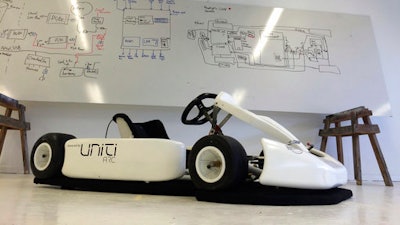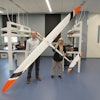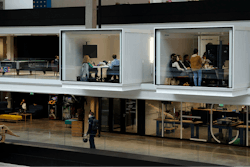
LUND, Sweden (AP) — A group of Swedish university students that raised 1.2 million euros ($1.3 million) in crowdfunding for their startup to build electric cars has caught the attention of German industrial heavyweight Siemens.
The two sides said Wednesday that they were starting a partnership that will see them create 50,000 lightweight city cars annually starting next year (view photos in gallery).
The twin-seat vehicles, called L7e, have 15kW engines with a maximum speed of 130 kilometers (81 miles) per hour. They weigh 400 kilograms (880 pounds) each and have a 150 kilometer (93 miles) range.
The cars are made from sustainable composite materials and will be unveiled in late 2017, with first deliveries scheduled for early 2019. The first high-end vehicle has a target price of 200,000 kronor ($22,285) — the price for an electric Smart Car in Sweden is at least 210,000 kronor ($23,400).
The vehicle's steering system resembles a Wii controller more than a traditional car's steering wheel.
Lewis Horne, the CEO of the startup, called Uniti Sweden, says the deal gives his company "the opportunity to not only develop a sustainable car, but also manufacture it in a sustainable way at a large scale."
Ola Janson of Siemens Industry Software said he was "really looking forward to having that partnership" between "Siemens as the very old, stable company, yet still innovative" and Uniti Sweden made up of "young people, innovative people, (who) don't have the legacy, don't have the limits like myself."
The student startup's ambitions come at a time of feverish activity within the auto and tech industries on building more ecological cars, more autonomous driving systems and even fully self-driving vehicles.
"There definitely are some famous success stories of automotive startups, but there are a lot more companies that are trying to break in right now, some that we think will succeed and some that won't," said Tim Stevens, editor of the website Roadshow, on the sidelines of the Geneva Motor Show this month. "Making a car is very, very difficult thing, and certifying that car worldwide is very difficult thing too."
The vehicle will be unveiled in the fall of 2017, with first deliveries scheduled for early 2019.






















